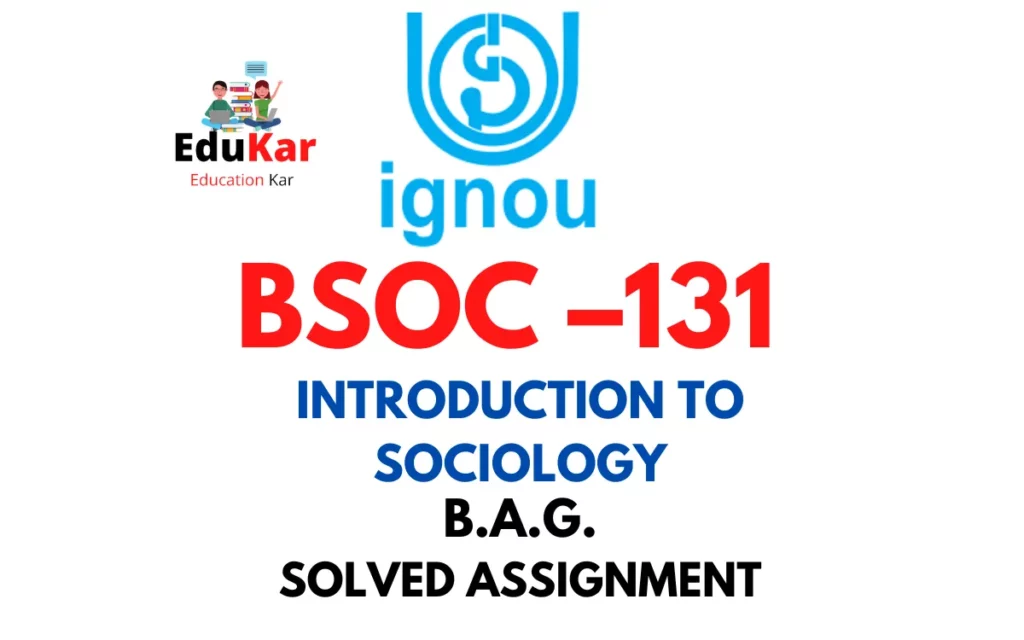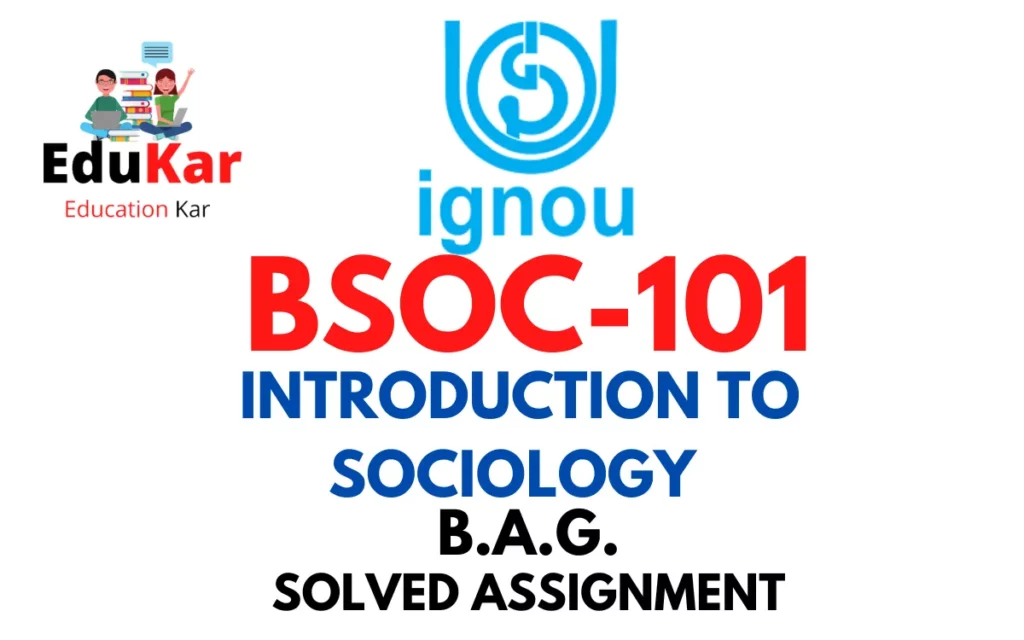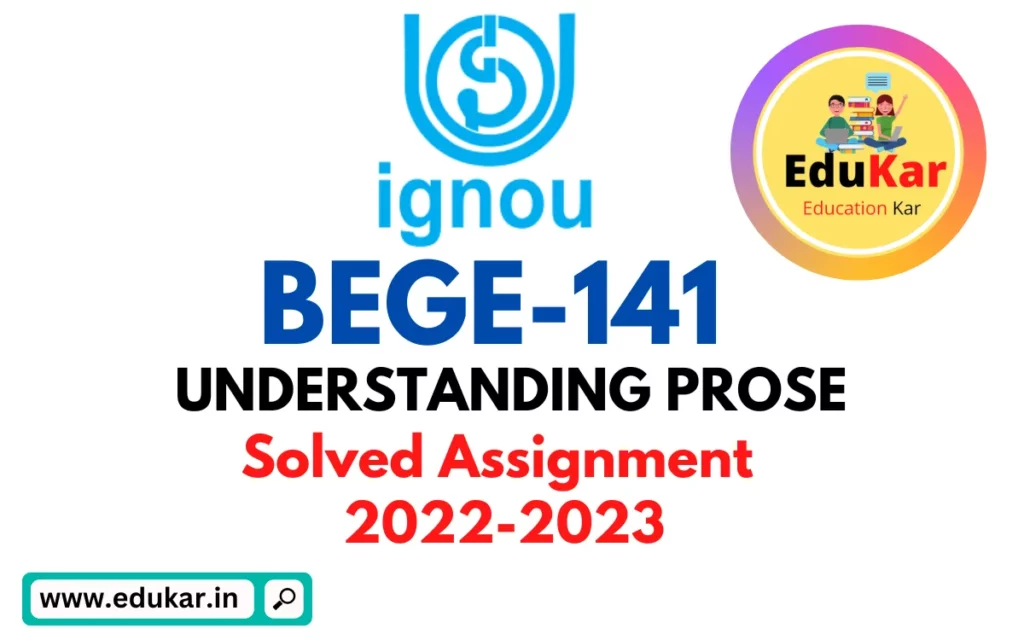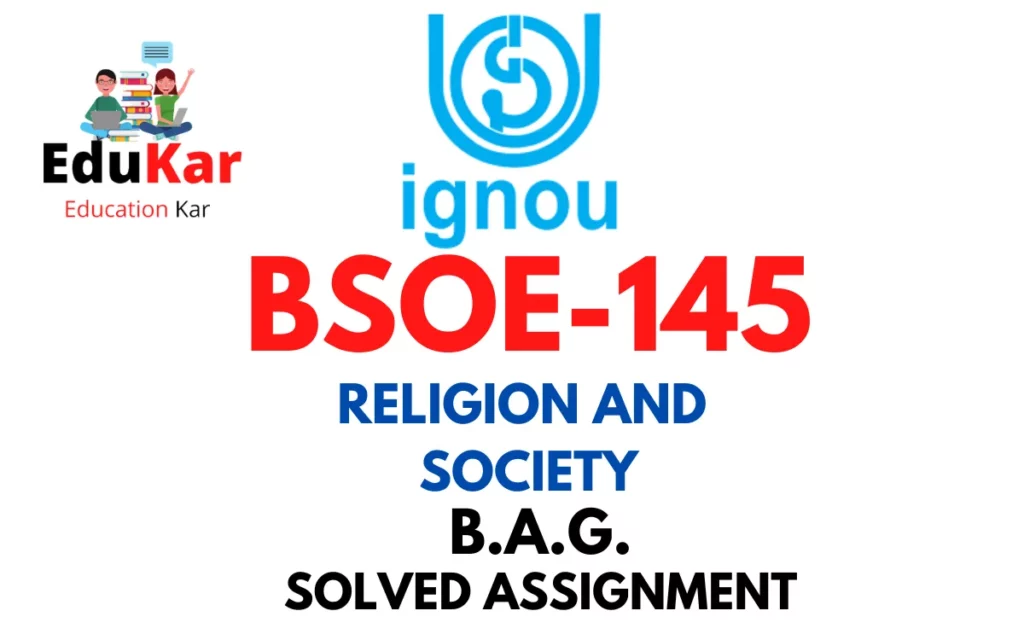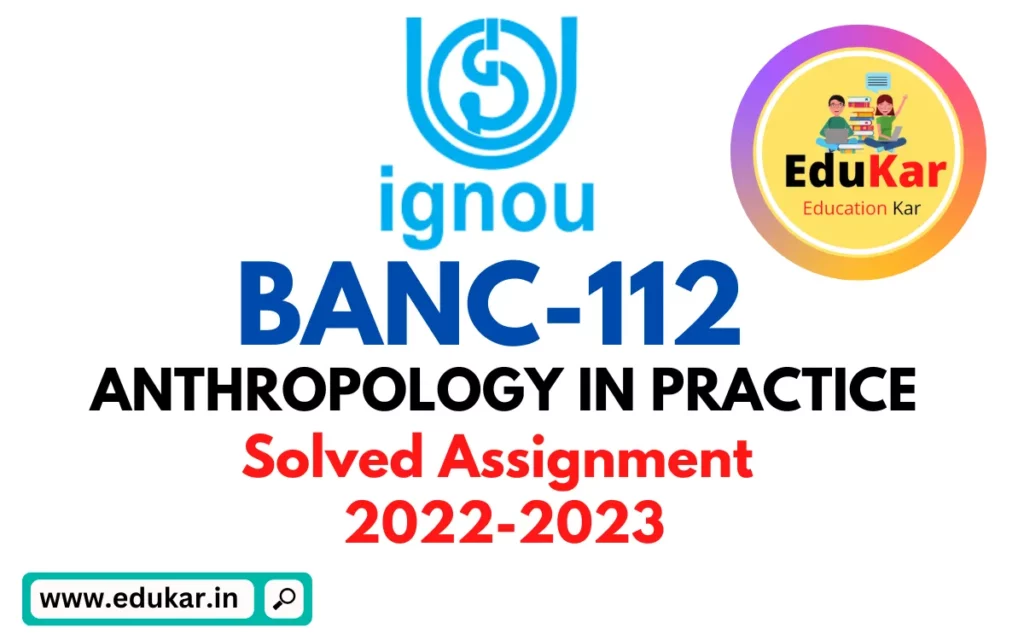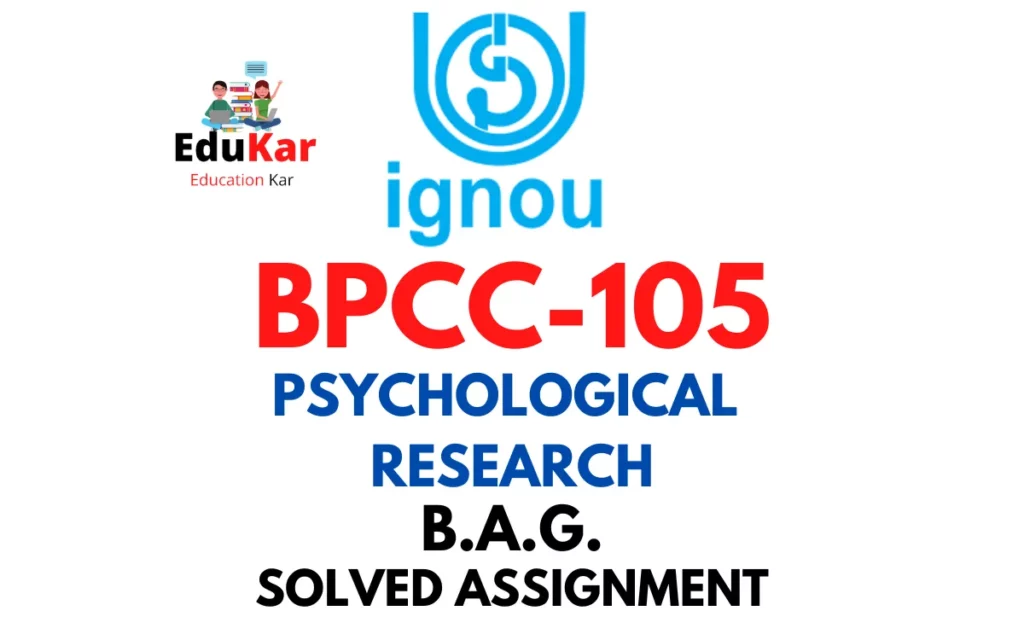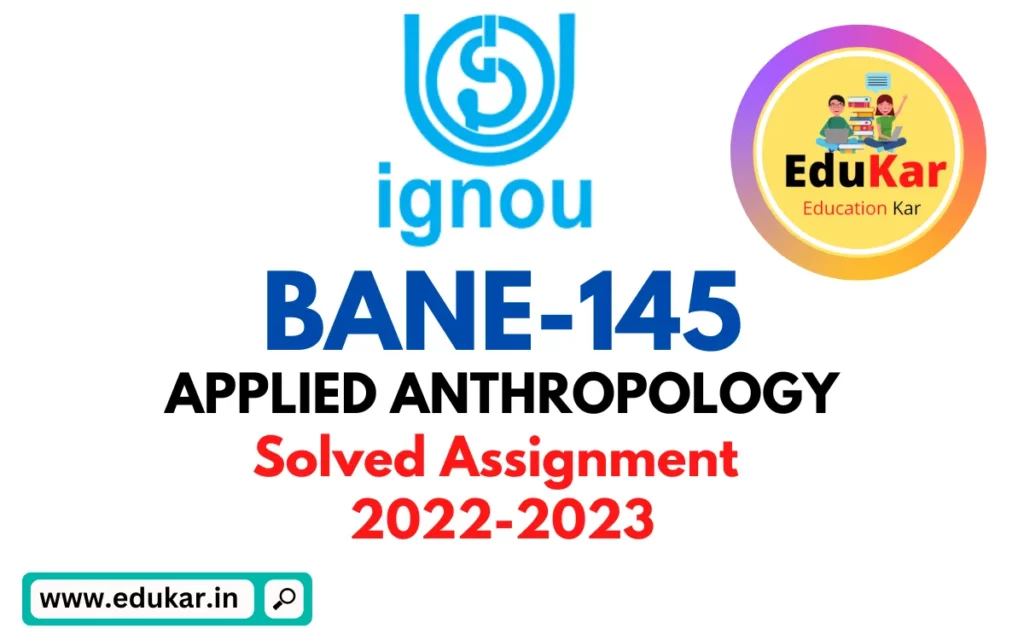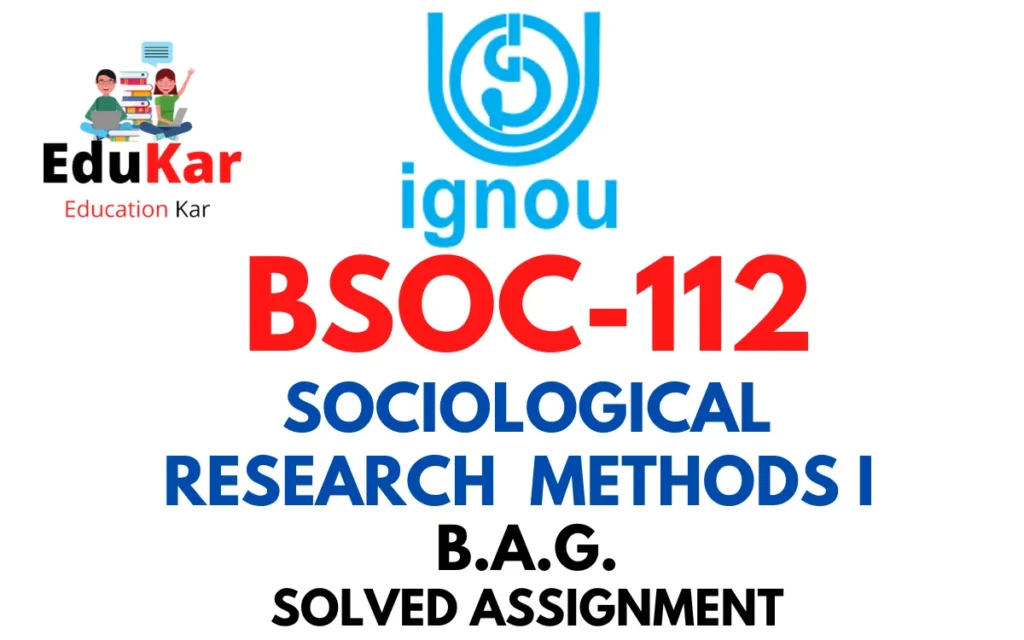Contents
- 1 Assignment – I
- 2 Answer the following in about 500 words each. 20X2=40
- 3 a. Discuss scientific method and its salient features.
- 4 b. Is anthropology a science? Discuss.
- 5 Assignment – II
- 6 Answer the following in about 250 words each. (Write Short Notes) 10X2=20
- 7 a. Research during Colonial and Post-Colonial Periods.
- 8 b. Qualitative and Quantitative Methods.
- 9 Answer the following questions in about 75 words each. 2X5=10
- 10 a. Statement of a Problem
- 11 b. Fieldwork in the 21st Century
- 12 c. Interview Schedule
- 13 d. Hypothesis
- 14 e. Ethics in Fieldwork
- 15 Assignment – III
- 16 a. Find out the family type of at least five families in your neighbourhood including for how long have they resided in the locality and what are the changes observed in them. What will be your methodology and tell us the reasons for choosing this methodology?
- 17 b. Draw the genealogy of your maternal family tracing till you maternal grandparents making yourself the ego.
- 18 c. Make an interview guide to conduct research on menstrual health among adolescents.
| Title | BANC-110: IGNOU BAG Solved Assignment 2022-2023 |
| University | IGNOU |
| Degree | Bachelor Degree Programme |
| Course Code | BANC-110 |
| Course Name | Research Methods |
| Programme Name | Bachelor of Arts (General) |
| Programme Code | BAG |
| Total Marks | 100 |
| Year | 2022-2023 |
| Language | English |
| Assignment Code | BANC 110/ASST/TMA/July 2022 and January 2023 |
| Last Date for Submission of Assignment: | For June Examination: 31st April For December Examination: 30th September |
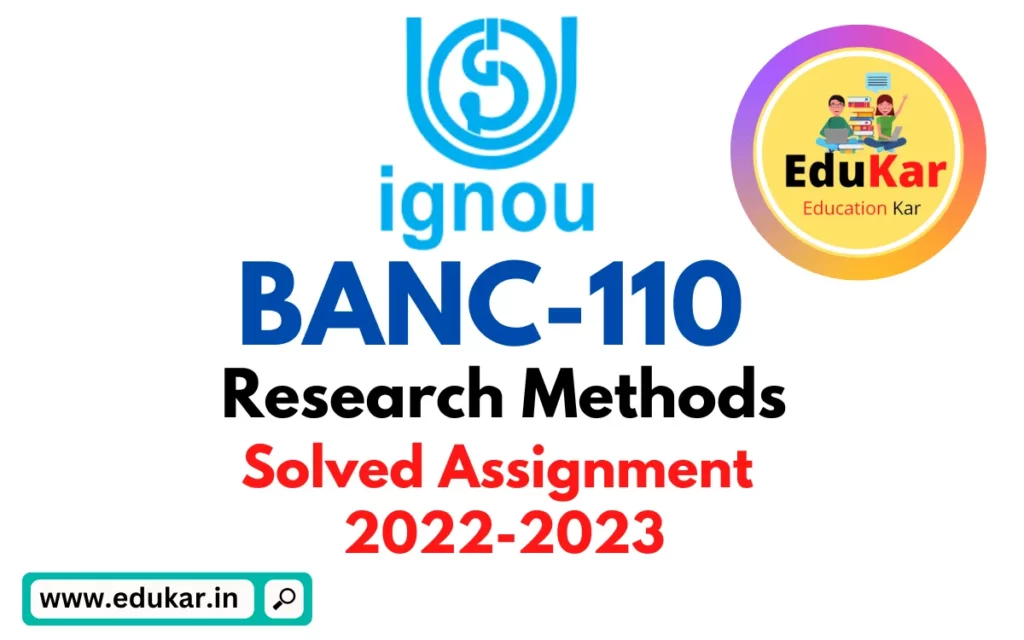
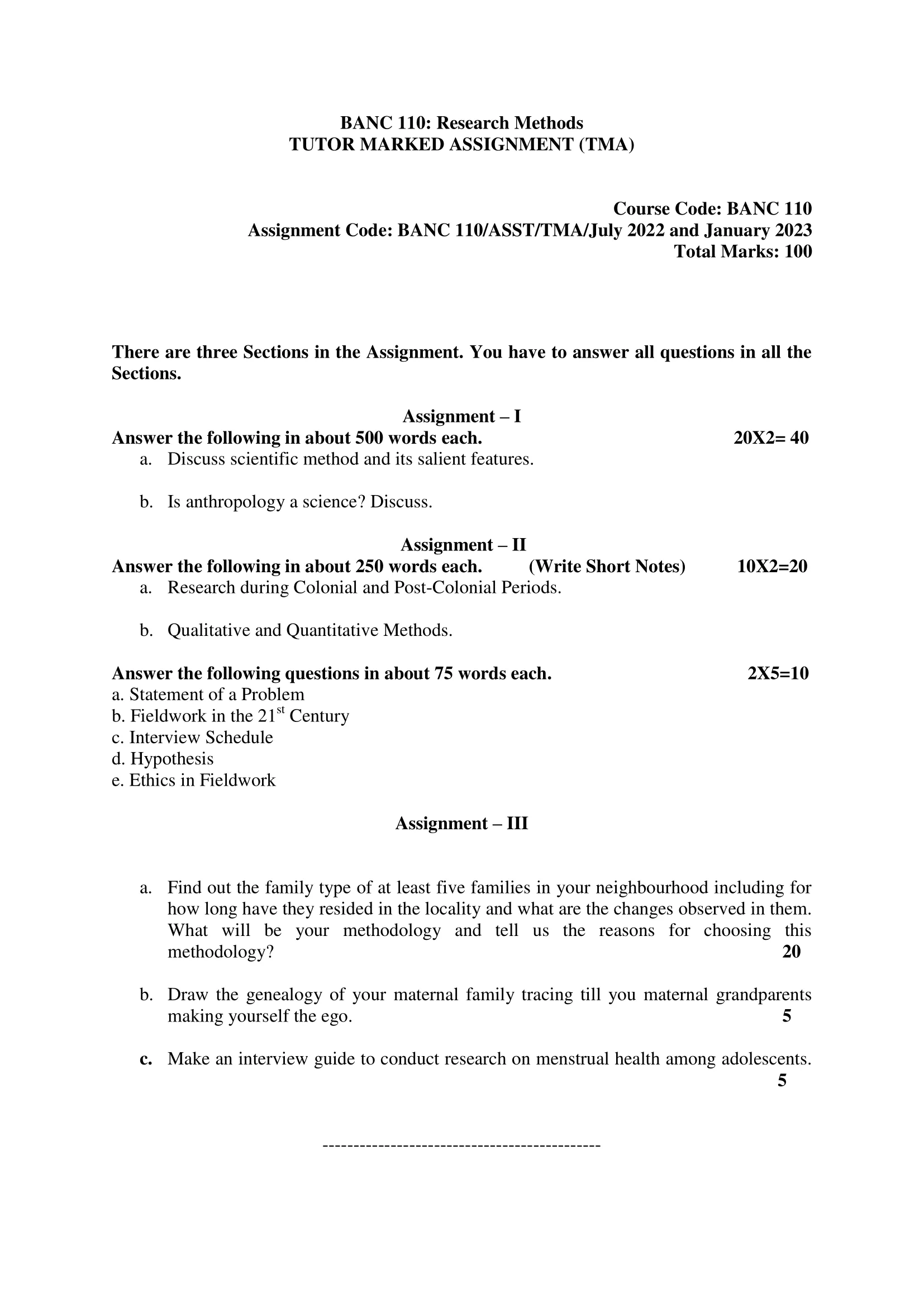
Assignment – I
Answer the following in about 500 words each. 20X2=40
a. Discuss scientific method and its salient features.
Ans: The scientific method is a systematic process used by scientists to understand and explain the natural world. It involves making observations, formulating hypotheses, testing these hypotheses through experiments and observations, and drawing conclusions based on the evidence gathered. The scientific method is essential in scientific inquiry and research, and its goal is to establish a logical and systematic understanding of the world around us.
Salient features of the scientific method include:
- Empiricism: Science is based on observations and experiments, and the scientific method relies on empirical evidence to support or refute scientific theories.
- Objectivity: The scientific method is designed to be objective and eliminate bias, personal opinions, and preconceptions. This is achieved by conducting experiments under controlled conditions and by collecting and analyzing data objectively.
- Replicability: Scientific findings are considered reliable only if they can be replicated by other scientists. Replicability is essential for verifying the validity of scientific claims and for establishing the reliability of scientific findings.
- falsifiability: Scientific theories must be falsifiable, meaning that they can be tested and potentially disproven through experimentation and observation. This is important because it allows scientists to constantly improve and refine their understanding of the natural world.
- Tentativeness: Scientific findings are provisional and subject to revision in light of new evidence. The scientific method is an ongoing process of discovery and refinement, and scientists are always open to the possibility of revising their theories in light of new evidence.
- Parsimony: The scientific method favors the simplest explanation that fits the evidence, also known as Occam’s razor. This means that scientists will prefer the simplest explanation that fits the available evidence rather than a more complex explanation that might be less likely to be correct.
b. Is anthropology a science? Discuss.
Ans: Anthropology is a complex field of study that encompasses various subdisciplines, including cultural anthropology, biological anthropology, linguistic anthropology, and archaeology. The question of whether anthropology is a science has been debated among anthropologists and other scholars for many years.
On one hand, some argue that anthropology is a science because it uses scientific methods, such as field research, observation, and the collection and analysis of data, to study human behavior and culture. Anthropologists also employ rigorous analytical techniques, including statistical analysis and hypothesis testing, to support their findings.
On the other hand, some argue that anthropology is not a science because it cannot make empirical predictions or laws with the same level of certainty as natural sciences such as physics or chemistry. Unlike the natural sciences, which can make predictions based on the laws of nature, the complexity and variability of human behavior and culture make it difficult to develop universal laws or predictions.
Additionally, anthropology is often considered a social science, which is different from the natural sciences in that it focuses on the study of human societies and culture. Unlike the natural sciences, social sciences, including anthropology, are influenced by the historical and cultural context in which they are practiced, and they often involve subjective interpretations and value-laden observations.
Despite these debates, it is widely acknowledged that anthropology is a discipline that draws from both the natural and social sciences, as well as the humanities. This interdisciplinary approach allows anthropologists to bring a unique perspective to the study of human behavior and culture and to make important contributions to our understanding of the human experience.
Assignment – II
Answer the following in about 250 words each. (Write Short Notes) 10X2=20
a. Research during Colonial and Post-Colonial Periods.
Ans: The research conducted during colonial and post-colonial periods played a significant role in shaping the field of academic inquiry and shaped the intellectual discourse of the time. During the colonial period, research was primarily conducted by European colonial powers who aimed to understand the colonized regions and peoples in order to better control and exploit them. The research was often heavily biased and distorted by the biases and assumptions of the colonial powers.
In contrast, post-colonial research was characterized by a growing sense of intellectual independence and an increasing desire to challenge the colonialist perspectives that had dominated earlier research. Researchers in post-colonial countries began to focus on topics and questions that were relevant to their own communities, such as the impact of colonialism, the histories and cultures of their societies, and the processes of decolonization.
One of the most notable examples of post-colonial research was the development of subaltern studies, a field of inquiry that focused on the experiences of marginalized and oppressed groups, including women, Dalits (formerly known as “untouchables”), and tribal populations. This research challenged the dominant narratives of colonialism and aimed to give voice to previously ignored or suppressed perspectives.
In general, research during the colonial and post-colonial periods has had a profound impact on the development of knowledge and the direction of academic inquiry. It has challenged dominant narratives, opened up new avenues of investigation, and helped to create a more inclusive and nuanced understanding of the world and its peoples.
b. Qualitative and Quantitative Methods.
Ans: Qualitative and quantitative methods are two broad approaches to research that differ in their underlying philosophies, methods, and goals.
Quantitative research is based on the scientific method and seeks to measure and quantify variables in order to test hypotheses and make generalizations about a population. It typically involves large sample sizes, structured data collection methods (such as surveys), and statistical analysis to test for relationships between variables. The goal of quantitative research is to establish cause-and-effect relationships and to make predictions about the behavior of a population based on statistical models.
Qualitative research, on the other hand, is more exploratory and interpretive in nature. It seeks to understand and describe social phenomena by exploring the perspectives, experiences, and meanings that individuals attach to them. Qualitative research typically involves smaller sample sizes, unstructured data collection methods (such as in-depth interviews or participant observation), and an emphasis on understanding the complexity of human behavior and experience. The goal of qualitative research is not to make generalizations about a population, but to gain a rich, in-depth understanding of a particular phenomenon.
Both qualitative and quantitative methods have their strengths and limitations, and the choice of method depends on the research question being asked and the goals of the study. For example, quantitative methods may be more appropriate for studying well-defined and objective phenomena, while qualitative methods may be better suited for exploring complex, subjective, or sensitive issues. In practice, many researchers employ a mixed-methods approach, combining both qualitative and quantitative methods in a single study to take advantage of the strengths of both.
Answer the following questions in about 75 words each. 2X5=10
a. Statement of a Problem
Ans: A statement of a problem is a concise and clear description of the issue or challenge that a research project aims to address. It is a crucial component of any research project as it provides the focus and direction for the study. A well-crafted statement of a problem should be specific, relevant, and significant, and should clearly define the gap in knowledge that the research project aims to fill. It should also be framed in a way that clearly connects the problem to the larger academic or practical context and clearly articulates the research questions or hypotheses that will guide the study. A statement of a problem is often the first step in the research process and sets the stage for the rest of the study.
b. Fieldwork in the 21st Century
Ans: Fieldwork is a critical aspect of many forms of research, particularly in the social sciences, where researchers aim to study human behavior and social phenomena in their natural settings. In the 21st century, fieldwork has been impacted by technological advances and changing social and political conditions.
On the one hand, technology has made it easier for researchers to collect and analyze data in the field. For example, advances in mobile technologies have enabled researchers to use smartphones and tablets to conduct surveys, collect data in real-time, and access online databases. These advancements have also made it easier for researchers to communicate with collaborators and to share data and results with a wider audience.
On the other hand, the 21st century has also brought new challenges to fieldwork. For example, increasing concerns about privacy and security have made it more difficult for researchers to access certain populations and to collect sensitive information. Political and social tensions in many parts of the world have also made it more difficult for researchers to work in some regions and to access certain populations.
Despite these challenges, fieldwork remains a critical component of research in the 21st century. By studying human behavior and social phenomena in their natural settings, researchers are able to gain a deeper understanding of the complexities of human behavior and to produce more robust and generalizable findings. In the 21st century, fieldwork continues to evolve in response to new technologies and changing social and political conditions, and remains a critical component of the research enterprise.
c. Interview Schedule
Ans: An interview schedule is a structured set of questions used to guide an interview with a research participant. It is a tool used by researchers to collect data in a systematic and consistent manner. An interview schedule is usually written prior to conducting the interview and serves as a roadmap for the interviewer, helping them to stay focused on the research questions and ensuring that all participants are asked the same questions in the same order.
An effective interview schedule should be well-designed and tailored to the research questions and goals of the study. It should include questions that are clear, concise, and relevant to the study. The schedule should also be flexible enough to allow for follow-up questions or clarification, as well as the opportunity for the participant to share additional information that is not covered by the original questions.
The use of an interview schedule has several advantages, including increased reliability and validity of the data collected, increased consistency in the way questions are asked, and improved efficiency in the data collection process. However, it is important to note that an interview schedule should not be used as a script, as the best interviews are often those that are flexible and allow for a back-and-forth conversation between the interviewer and participant.
d. Hypothesis
Ans: A hypothesis is a statement or an explanation that attempts to predict the relationship between two or more variables. In research, a hypothesis is a tentative explanation for an observed phenomenon that can be tested through further investigation. A hypothesis is a critical component of the scientific method, as it provides a clear and testable prediction that can be used to guide and direct the research process.
A well-formed hypothesis should be clear, concise, and specific, and should be based on prior research and theory. It should also be falsifiable, meaning that it can be tested and potentially proven false. The process of testing a hypothesis involves collecting data through experiments or observation and using statistical methods to determine if the data supports or refutes the hypothesis.
If the data supports the hypothesis, it may become a theory, which is a widely accepted explanation for a phenomenon that has been tested and supported by a large body of evidence. If the data does not support the hypothesis, the hypothesis may need to be revised or rejected and a new hypothesis may be formed.
e. Ethics in Fieldwork
Ans: Ethics in fieldwork refer to the principles and standards that govern the conduct of research with human participants. Ethical considerations are particularly important in fieldwork, where researchers interact with and collect data from people in their natural environments.
The ethical principles that guide fieldwork include respect for persons, which involves obtaining informed consent and protecting the privacy and confidentiality of participants; beneficrimination, which involves avoiding harm or exploitation of participants; and beneficrimination, which involves ensuring that the benefits of the research outweigh the risks to participants.
One of the key ethical considerations in fieldwork is informed consent. Researchers must obtain the informed consent of participants before collecting data, which involves explaining the purpose of the study, the methods used to collect data, and the potential risks and benefits of participating. Participants must be free to choose whether or not to participate, and they must have the right to withdraw from the study at any time.
Another important ethical consideration in fieldwork is confidentiality and privacy. Researchers must take steps to protect the privacy and confidentiality of participants and to ensure that their data is not disclosed to unauthorized parties. This may involve using anonymous data, using secure storage methods for collected data, and using confidentiality agreements with research participants.
Assignment – III
a. Find out the family type of at least five families in your neighbourhood including for how long have they resided in the locality and what are the changes observed in them. What will be your methodology and tell us the reasons for choosing this methodology?
Ans: The methodology that could be used to study families in a neighborhood is qualitative research, specifically ethnographic research. Ethnographic research involves immersing oneself in the community being studied and collecting data through observation, interviews, and the collection of artifacts.
The reasons for choosing this methodology include:
- Contextual understanding: Ethnographic research allows the researcher to understand the context in which families live and how their experiences are shaped by their environment.
- Rich data: Ethnographic research provides rich and in-depth data that can be used to understand the experiences and perspectives of families in a neighborhood.
- Longevity of study: Ethnographic research is often a long-term study that allows the researcher to observe changes over time, making it a suitable method for studying families that have resided in the neighborhood for an extended period.
- Inclusivity: Ethnographic research is inclusive and allows for the voices of all members of a family to be heard, not just the dominant or most vocal members.
In conducting the study, the researcher would first establish rapport with the families in the neighborhood and gain their consent to participate in the study. The researcher would then spend time in the neighborhood, observing the families, conducting interviews with family members, and collecting artifacts that are significant to the families.
The data collected would be analyzed to identify common themes and patterns, and the researcher would use this information to develop a nuanced understanding of the family types in the neighborhood, including the length of time they have lived there and any changes that have been observed.
In conclusion, qualitative ethnographic research is an appropriate methodology for studying families in a neighborhood. It allows for a contextual understanding of the families, provides rich and in-depth data, is inclusive, and can provide insights into changes observed over time.
b. Draw the genealogy of your maternal family tracing till you maternal grandparents making yourself the ego.
Ans: Do it by yourself.
c. Make an interview guide to conduct research on menstrual health among adolescents.
Ans: Interview Guide: Research on Menstrual Health among Adolescents
I. Introduction
- Introduce yourself and the purpose of the study
- Explain the importance of menstrual health and how it affects adolescents
- Obtain informed consent from the participant
II. Background Information
- Ask about the participant’s age, gender, and socioeconomic status
- Ask about the participant’s current menstrual status and history
III. Knowledge and Attitudes
- Ask about the participant’s knowledge of menstrual health
- Ask about their attitudes towards menstruation
- Ask about the participant’s sources of information on menstrual health
IV. Menstrual Products
- Ask about the participant’s preferred menstrual product
- Ask about their experiences using menstrual products
- Ask about any challenges or difficulties they have faced using menstrual products
V. Menstrual Health Management
- Ask about the participant’s menstrual health management practices
- Ask about their experiences accessing menstrual health resources and support
- Ask about any challenges or difficulties they have faced related to menstrual health management
VI. School and Menstrual Health
- Ask about the participant’s experiences with menstrual health in school
- Ask about their experiences accessing menstrual health resources and support in school
- Ask about any challenges or difficulties they have faced related to menstrual health in school
VII. Discussion
- Provide an opportunity for the participant to share any additional thoughts or experiences related to menstrual health
VIII. Conclusion
- Thank the participant for their time
- Provide them with a copy of the informed consent form for their records
- Provide information on how to access support services if needed.
How to Download BANC-110 Solved Assignment?
You can download it from the www.edukar.in, they have a big database for all the IGNOU solved assignments.
Is the BANC-110 Solved Assignment Free?
Yes this is absolutely free to download the solved assignment from www.edukar.in
What is the last submission date for BANC-110 Solved Assignment?
For June Examination: 31st April, For December Examination: 30th October





